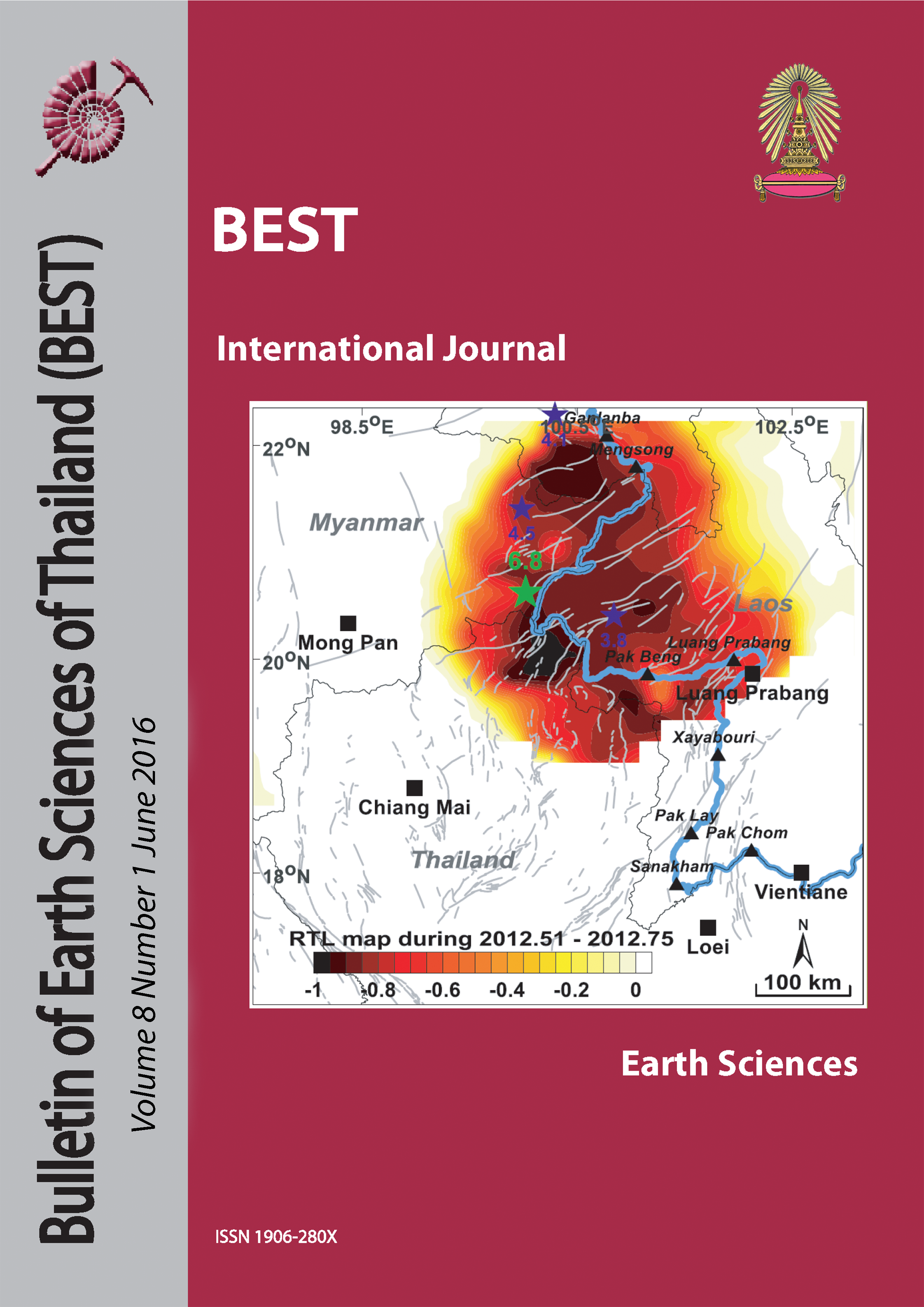Geophysical and Hydrogeological Study for Evaluating Seawater Intrusion in Coastal Aquifers of Amphoe Cha-am, Changwat Phetchaburi
Main Article Content
Abstract
The study area is a famous tourist coastal area, located in Amphoe Cha-am, Changwat Phetchaburi, where contains densely populated area. The need of a large amount of fresh water thus tends to be increased as well as intensive extraction of groundwater from coastal aquifers has decreased freshwater outflow to the sea and leads to local groundwater depression. Seawater intrusion is one of the rising problems in this area due to seawater movement inland and rising toward fresh water well. In this study, an integrated geophysical and hydrogeological study was carried out to evaluate seawater intrusion in coastal aquifers. The 22 dataset of vertical electrical sounding method (VES), is useful to identify variations in electrical characteristics of coastal aquifers. Hydrogeological characteristics were generated from drilling data, electric log data, measured static water levels, and well screen depths. By integrating both investigations, we found that seawater intrusion mainly occurs in Qcl aquifer at a depth of 30-50 meters and laterally intrudes about 7 kilometers inland. Furthermore resistivity values ranging between 0-10 Ωm, represents Qcl getting highly influenced by seawater intrusion, while resistivity values are in the range of 10-15 Ωm in Gr aquifer, suggesting that is partially influenced by seawater intrusion.
Article Details

This work is licensed under a Creative Commons Attribution-NonCommercial-NoDerivatives 4.0 International License.
Copyright © 2008 Department of Geology, Faculty of Science, Chulalongkorn University. Parts of an article can be photocopied or reproduced without prior written permission from the author(s), but due acknowledgments should be stated or cited accordingly.
References
Bear, J., 1999. Seawater intrusion in coastal aquifers. Springer Science & Business Media.
Bobachev, A.A., 2003. IPI2Win software.
Cimino, A., Cosentin o, C., Oieni, A. and Tranchina, L., 2008. A geophysical and geochemical approach for seawater intrusion assessment in the Acquedolci coastal aquifer (Northern Sicily). Environmental Geology, 55(7): 1473-1482.
Essink, G.H.P.O., 2001. Improving fresh groundwater supply-problems and solutions. Ocean & Coastal Management, 44(5-6): 429--449.
Gopinath, S. and Srinivasamoorthy, K., 2015. Application of Geophysical and Hydrogeochemical Tracers to Investigate Salinisation Sources in Nagapatinam and Karaikal Coastal Aquifers, South India. Aquatic Procedia, 4: 65-71.
Kaya, M.A., Özürlan, G. and Balkaya, Ç., 2015. Geoelectrical investigation of seawater intrusion in the coastal urban area of Çanakkale, NW Turkey. Environmental Earth Sciences, 73(3): 1151-1160.
Konkul, J., Rojborwornwittaya, W. and Chotpantarat, S., 2014. Hydrogeologic characteristics and groundwater potentiality mapping using potential surface analysis in the Huay Sai area, Phetchaburi province, Thailand. Geoscience Journal, 18(1): 89-103.
Kouzana, L., Benassi, R., Ben mammou, A. and Sfar felfoul, M., 2010. Geophysical and hydrochemical study of the seawater intrusion in Mediterranean semi arid zones. Case of the Korba coastal aquifer (CapBon, Tunisia). Journal of African Earth Sciences, 58(2): 242-254.
Nowroozi, A.A., Horrocks, S.B. and Henderson, P., 1999. Saltwater intrusion into the freshwater aquifer in the eastern shore of Virginia: a reconnaissance electrical resistivity survey. Journal of Applied Geophysics, 42(1): 1-22.
Ramingwong, T., 2003. Groundwater. Department of Geology, Chaingmai University.
Ravindran, A.A., 2013. Coastal-zone shallow-aquifer characterization study using geoelectrical and geochemical methods in Zirconium Complex, Atomic Energy, Pazhayakayal, Thoothukudi, India. Russian Geology and Geophysics, 54(12): 1529-1538.
Sabet, M.A., 1975. Vertical Electrical Resistivity Soundings to locate groundwater resources: a feasibility study. Department of Geophysical Sciences: 63.
Sherif, M., Mahmoudi, A.E., Garamoon, H., Kacimov, A., Akram, S., Ebraheem, A. and Shetty, A., 2006. Geoelectrical and hydrogeochemical studies for delineating seawater intrusion in the outlet of Wadi Ham, UAE. Environmental Geology, 49(4): 536-551.
Song, S., Lee, J. and Park, N., 2006. Use of vertical electrical soundings to delineate seawater intrusion in a coastal area of Byunsan, Korea. Environmental Geology, 52(6): 1207-1219.
Telford, W.M., Geldart, L.P. and Sheriff, R.E., 1990. Applied Geophysics. Cambridge University Press, 792 pages pp.
Van Dam, J.C. and Meulenkamp, J.J., 1967. Some results of the geo-electrical resistivity method in ground water investigations in the Netherlands. Geophysical Prospecting, 15(1): 92-115.
Werner, A.D., Bakker, M., Post, V.E.A., Vandenbohede, A., Lu, C., AtaieAshtiani, B., Simmons, C.T. and Barry, D.A., 2013. Seawater intrusion processes, investigation and management: Recent advances and future challenges. Advances in Water Resources, 51: 3-26.
Zohdy, A.A., Eaton, G.P. and Mabey, D.R., 1974. Application of surface geophysics to ground-water investigations. US Government Printing Office.


